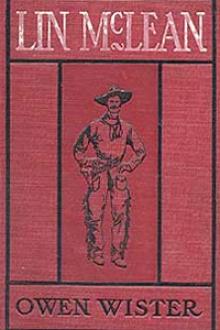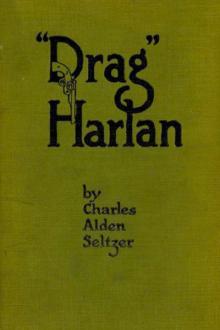The Jimmyjohn Boss, and Other Stories, Owen Wister [easy novels to read txt] 📗

- Author: Owen Wister
Book online «The Jimmyjohn Boss, and Other Stories, Owen Wister [easy novels to read txt] 📗». Author Owen Wister
At whom or what was he aiming these shafts of truth? Or did he moralize merely because health and the weather had steeped him in that serenity which lifts us among the spheres? Well, sometimes he went on from these beginnings and told me wonderful things.
“I reckon,” said he, presently, “that knowing when to change your mind would be pretty near knowledge enough for plain people.”
Since my acquaintance with him—this was the second summer of it—I had come to understand him enough to know that he was unfathomable. Still, for a moment it crossed my thoughts that perhaps now he was discoursing about himself. He had allowed a jealous foreman to fall out with him at Sunk Creek ranch in the spring, during Judge Henry's absence. The man, having a brief authority, parted with him. The Southerner had chosen that this should be the means of ultimately getting the foreman dismissed and himself recalled. It was strategic. As he put it to me: “When I am gone, it will be right easy for the Judge to see which of us two he wants. And I'll not have done any talking.” All of which duly befell in the autumn as he had planned: the foreman was sent off, his assistant promoted, and the Virginian again hired. But this was meanwhile. He was indulging himself in a several months' drifting, and while thus drifting he had written to me. That is how we two came to be on our way from the railroad to hunt the elk and the mountain-sheep, and were pausing to fish where Buffalo Fork joins its waters with Snake River. In those days the antelope still ran there in hundreds, the Yellowstone Park was a new thing, and mankind lived very far away. Since meeting me with the horses in Idaho the Virginian had been silent, even for him. So now I stood casting my fly, and trusting that he was not troubled with second thoughts over his strategy.
“Have yu' studded much about marriage?” he now inquired. His serious eyes met mine as he lay stretched along the ground.
“Not much,” I said; “not very much.”
“Let's swim,” he said. “They have changed their minds.”
Forthwith we shook off our boots and dropped our few clothes, and heedless of what fish we might now drive away, we went into the cool, slow, deep breadth of backwater which the bend makes just there. As he came up near me, shaking his head of black hair, the cowpuncher was smiling a little.
“Not that any number of baths,” he remarked, “would conceal a man's objectionableness from an antelope—not even a she-one.”
Then he went under water, and came up again a long way off.
We dried before the fire, without haste. To need no clothes is better than purple and fine linen. Then he tossed the flap-jacks, and I served the trout, and after this we lay on our backs upon a buffalo-hide to smoke and watch the Tetons grow more solemn, as the large stars opened out over the sky.
“I don't care if I never go home,” said I.
The Virginian nodded. “It gives all the peace o' being asleep with all the pleasure o' feeling the widest kind of awake,” said he. “Yu' might say the whole year's strength flows hearty in every waggle of your thumb.” We lay still for a while. “How many things surprise yu' any more?” he next asked.
I began considering; but his silence had at length worked round to speech.
“Inventions, of course,” said he, “these hyeh telephones an' truck yu' see so much about in the papers—but I ain't speaking o' such things of the brain. It is just the common things I mean. The things that a livin', noticin' man is liable to see and maybe sample for himself. How many o' them kind can surprise yu' still?”
I still considered.
“Most everything surprised me onced,” the cow-puncher continued, in his gentle Southern voice. “I must have been a mighty green boy. Till I was fourteen or fifteen I expect I was astonished by ten o'clock every morning. But a man begins to ketch on to folks and things after a while. I don't consideh that when—that afteh a man is, say twenty-five, it is creditable he should get astonished too easy. And so yu've not examined yourself that-away?”
I had not.
“Well, there's two things anyway—I know them for sure—that I expect will always get me—don't care if I live to thirty-five, or forty-five, or eighty. And one's the ways lightning can strike.” He paused. Then he got up and kicked the fire, and stood by it, staring at me. “And the other is the people that other people will marry.”
He stopped again; and I said nothing.
“The people that other people will marry,” he repeated. “That will surprise me till I die.”
“If my sympathy—” I began.
But the brief sound that he gave was answer enough, and more than enough cure for my levity.
“No,” said he, reflectively; “not any such thing as a fam'ly for me, yet. Never, it may be. Not till I can't help it. And that woman has not come along so far. But I have been sorry for a woman lately. I keep thinking what she will do. For she will have to do something. Do yu' know Austrians? Are they quick in their feelings, like I-talians? Or are they apt to be sluggish, same as Norwegians and them other Dutch-speakin' races?”
I told him what little I knew about Austrians.
“This woman is the first I have ever saw of 'em,” he continued. “Of course men will stampede into marriage in this hyeh Western country, where a woman is a scanty thing. It ain't what Hank has done that surprises me. And it is not on him that the sorrow will fall. For she is good. She is very good. Do yu' remember little black Hank? From Texas he claims he is. He was working on the main ditch over at Sunk Creek last summer when that Em'ly hen was around. Well, seh, yu' would not have pleasured in his company. And this year Hank is placer-mining on Galena Creek, where we'll likely go for sheep. There's Honey Wiggin and a young fello' named Lin McLean, and some others along with the outfit. But Hank's woman will not look at any of them, though the McLean boy is a likely hand. I have seen that; for I have done a right smart o' business that-a-way myself, here and there. She will mend their clothes for them, and she will cook lunches for them any time o' day, and her conduct gave them hopes at the start. But I reckon Austrians have good religion.”
“No better than Americans,” said I.
But the Virginian shook his head. “Better'n what I've saw any Americans have. Of course I am not judging a whole nation by one citizen, and especially her a woman. And of course in them big Austrian towns the folks has shook their virtuous sayin's loose from their daily doin's, same as we have. I expect selling yourself brings the quickest returns to man or woman all the world over. But I am speakin' not of towns, but of the back country, where folks don't just merely arrive on the cyars, but come into the world the natural way, and grow up slow. Onced a week





Comments (0)